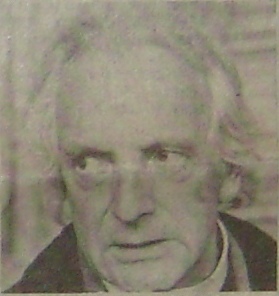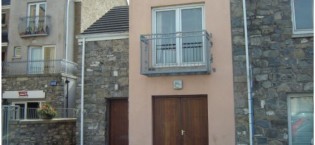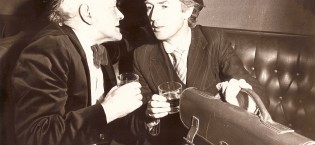Walter’s World
 It would be wrong to call him a recluse, for apart altogether from his standing as one of the greatest personalities in local theatre over the past half century, Walter Mc Donagh also happens to be one of nature’s true gentlemen. But when it comes to talking about himself and his career in directing and acting, he is extremely reticent. Like the superb actor he is, every line is delivered with precision; every question is considered with caution normally reserved for script-reading. It is no that he is being deliberately evasive; just that, despite his years on the stage, there remains a streak of shyness and engaging modesty. “I have never realise that actors could be shy people”, I venture. “That probably explains why I’m no good at it”, he responds. Thus, Walter Mc Donagh, actor, director, throws down the biggest challenge we have yet encountered in this series.
It would be wrong to call him a recluse, for apart altogether from his standing as one of the greatest personalities in local theatre over the past half century, Walter Mc Donagh also happens to be one of nature’s true gentlemen. But when it comes to talking about himself and his career in directing and acting, he is extremely reticent. Like the superb actor he is, every line is delivered with precision; every question is considered with caution normally reserved for script-reading. It is no that he is being deliberately evasive; just that, despite his years on the stage, there remains a streak of shyness and engaging modesty. “I have never realise that actors could be shy people”, I venture. “That probably explains why I’m no good at it”, he responds. Thus, Walter Mc Donagh, actor, director, throws down the biggest challenge we have yet encountered in this series.
Walter was born and grew up in Strokestown. Although there was no family connection with drama, he started acting at a very young age “because there as nothing else to do”. With a group of friends, he formed the “Saint Asicus Players”, which he reckons lasted for no more than a year. One of their achievements, however, was to present a play at the Western Drama Festival in Tubbercurry in only its second year. He also recalls playing Judas in a Passion Play for the adult dramatic society in Strokestown, a role he was to repeat with the Bernadette Players in Sligo some years later. Although Walter doubts if that young Strokestown group was any good, it must have had some merit because a couple of its members went on to act professionally, and one of them is now a television producer in Canada. Walter’s road to Sligo, meanwhile was rather circuitous. He went to Dublin’s Clarence Hotel to train as a chef, but found it impossible to shake off that acting bug, and his spare time was spent attending courses at the Brendan Smith Acting Academy. During a hotel strike, he accepted an invitation to work with the CIE catering department for a short time. He was subsequently sent to Sligo for a month, and he’s been here since.
A short time after arriving here, he was introduced to Charlie and Maggie Hughes, he Driving forces behind he Sligo Unknown Players. He recalls people such as Kay Guinane, Mary Mc Govern, John and Tom Mullaney, Gerry Westby and Eddie Mc Dermottroe being very active in the drama movement in those days. Their common interest in drama drew them together, and they have all been great friends ever since. “There’s no doubt that an interest or involvement in drama is a great way of meeting people. One of the greatest advantages for anyone coming into a new town is to have been a member of a drama group or association. It breaks down barriers immediately, and its a great introduction to such a wide cross-section of people. It certainly helped me to settle in Sligo, and I’m sure the same could be said of many more people before me and since”, he maintains.
The early involvement with the Unknown Players was also a great honour for the young actor, as he had heard of the fine reputation long before arriving in Sligo. As he took his place amongst the elite of the local drama movement, he could scarcely have imagined that he was to become such a major influence in his own right. The days of the Unknown Players were numbered, however. There was a split in the ranks over whether they should take plays on the festival circuit, and in 1956 a breakaway group formed what was to become the Sligo Drama Circle. Almost without knowing what was happening, Walter found himself directing the first production by the new group, “Thy Dear father”. “I must have given them the impression that I knew what I was doing, but I couldn’t believe they were asking me to direct their first play. It was new to me, and I found it very demanding. There was a bit of trial and error involved, but we must have got it nearly right because we got second place in the All-Ireland”, Walter recalls. There have been numerous successes since that debut performance, as Walter went on to distinguish himself as both an actor and director, his reputation enhanced by the annual production of Yeats’ plays for the Summer School students.
He says he likes acting and directing in equal measure, but he clearly enjoys the luxury of being directed by someone else. “Provided you get on well with the director, there’s no problem. There may be times when I feel I would not have done a particular scene in a particular way, but you talk about it and you work it out. As a director you’ve got to learn every part in the play, so in effect you could be playing twelve different parts, and you’ve got to get them all right. As an actor, on the other hand, you can concentrate exclusively on your own role, and that makes it much easier”, he says. While he enjoys reminiscing about the “good old days”, he would not necessarily agree that things were any better then. It was easier to get people involved then, but the overall production wasn’t as good, he believes. “You could get away with virtually anything in those days, whereas the theatre-going public today is much more perceptive and demanding. A good example of this is the fact that prompters were an integral part of a production in the early days, whereas nowadays the people on stage are expected not to make mistakes or have a blank. “Another big difference is the great difficulty these days in getting commitment from people. There are so many other attractions, and so many other things for people to do in their spare time. I wouldn’t go as far as to say there is a danger that amateur drama could disappear – it will always be with us – but it is definitely more difficult than ever to get the necessary commitment from people”.
One of his greatest pleasures these days is teaching youngsters the basic rudiments of the trade. “I’m a firm believer that drama can be a great confidence booster for youngsters, and it’s more important than ever now, because communication is everything. I never look upon it in the sense of building a career for the kids, because trying to make stars out of children is a load of rubbish. The real importance is giving them that bit of self-confidence. If they can’t speak up for themselves and express themselves, they are at an immediate disadvantage”, he says. Walter’s last stage appearance was in last year’s Half Door Company’s production of “The Playboy”, directed by his daughter Mary. He declined an offer to appear in this year’s summer show, and he has no definite plans for another stage appearance. Nonetheless, it would be inaccurate to say he’s retired. The foot may be off the accelerator, but there’s plenty of mileage left yet.
An interview by Jim Gray in The Sligo Champion, Showstopper Series, June 11th, 1993
Tags: History, Reflections








